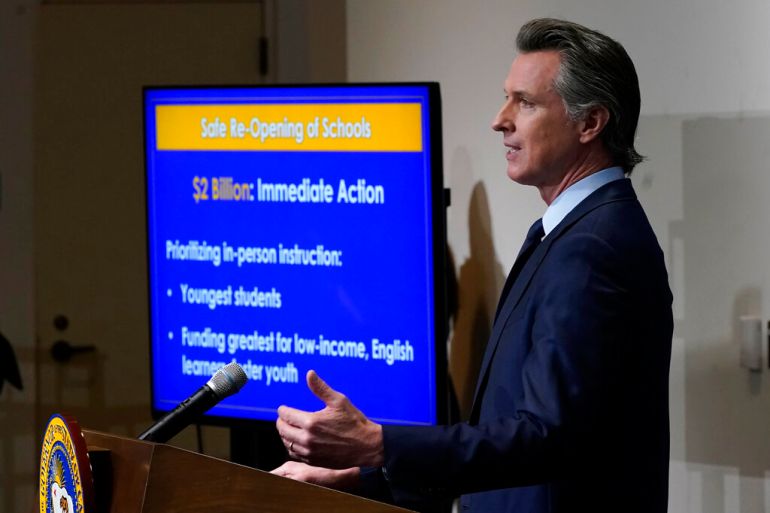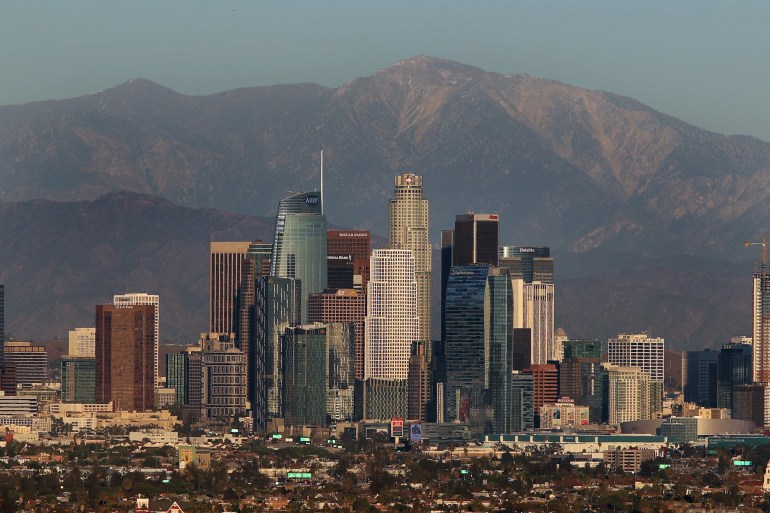Health coverage for all immigrants in California: Newsom plan
California would be the first United States state to cover everyone under its Medicaid plan regardless of immigration status.

California would be the first US state to provide health coverage to all immigrants within its borders, regardless of how they arrived in the state, under a new budget plan proposed by Governor Gavin Newsom on Monday.
Newsom’s proposal would use part of California’s booming budget surplus to provide healthcare coverage through the state’s system for any low-income resident, regardless of immigration status. California already offers healthcare coverage to immigrants up to age 26 and over 55.
Keep reading
list of 4 itemsUS comedian Bob Saget, star of Full House, dead at 65
Top US universities accused of illegally limiting financial aid
US and Russia still at odds after talks over Ukraine tensions
California, which is equal to the world’s fifth-largest economy, plans to begin covering immigrants 50 and over in May. Now, Newsom wants state lawmakers to cover the remaining uninsured immigrants starting in 2024 at an estimated cost of $2.4bn per year, The Associated Press reported.
Newsom’s proposal to provide healthcare to immigrants is likely to garner attention as the United States struggles with an ongoing immigration crisis. Earlier this year, the state made COVID-19 vaccines available to farm workers who faced heightened rises of infection from the coronavirus. Newsom’s new plan was one of a number of policies he proposed on Monday aimed at reducing economic disparities in the state.
Overall, Newsom sent the California legislature a $286.4bn budget that builds on what analysts expect to be at least a $31bn surplus the year ahead.
The governor’s annual budget proposes nearly $10bn in new spending on five major “existential threats” Newsom sees confronting the state: COVID-19, climate change, homelessness, inequality and violent crime, according to a fact sheet from the governor’s office.
The plan will set parameters for months of negotiations with Democrats in control of the California state legislature on key priorities for state programmes.
Some progressive legislative Democrats last week proposed creating in California the nation’s first universal healthcare system, backed by steep tax hikes that would have to be approved by voters.
On Monday, Newsom additionally proposed spending $648m to back wildland firefighters and buy more helicopters and bulldozers, plus another $1.2bn on top of the current budget year’s $1.5bn for forest management.
Another $750m would go to drought relief, on top of the current budget year’s $5.2bn water package.
Newsom pledged to spend $300m on boosting law enforcement efforts to combat retail theft and another $2.7bn on coronavirus testing and hospital staffing.
To confront the state’s seemingly intractable homelessness problem, he proposed spending $2bn for mental health services, housing, and clearing homeless encampments. That would be in addition to last year’s $12bn package and would create a projected 55,000 new housing units and treatment slots.

To help with the ever-growing cost of living in California, Newsom proposed “doubling down” on the state’s existing plan to provide free, universal pre-kindergarten; adding thousands of childcare slots and boosting summer school programmes.
He also proposed continued aid to small businesses hit hard in the coronavirus pandemic by waiving fees and providing hundreds of millions in grants and tax breaks.
Newsom’s massive projected budget and surplus bring the state a long way from the gloom of 2020, when Newsom and state lawmakers cut spending, raised taxes and pulled money from the state’s savings accounts to cover what they feared would be a pandemic-fueled deficit. That never happened. Instead, state revenues soared like never before.
In September, collections from the state’s three largest taxes — personal income, sales and corporation — were 40 percent higher than in September 2020 and nearly 60 percent higher than September 2019, before the pandemic hit, according to the California Legislative Analyst’s Office.